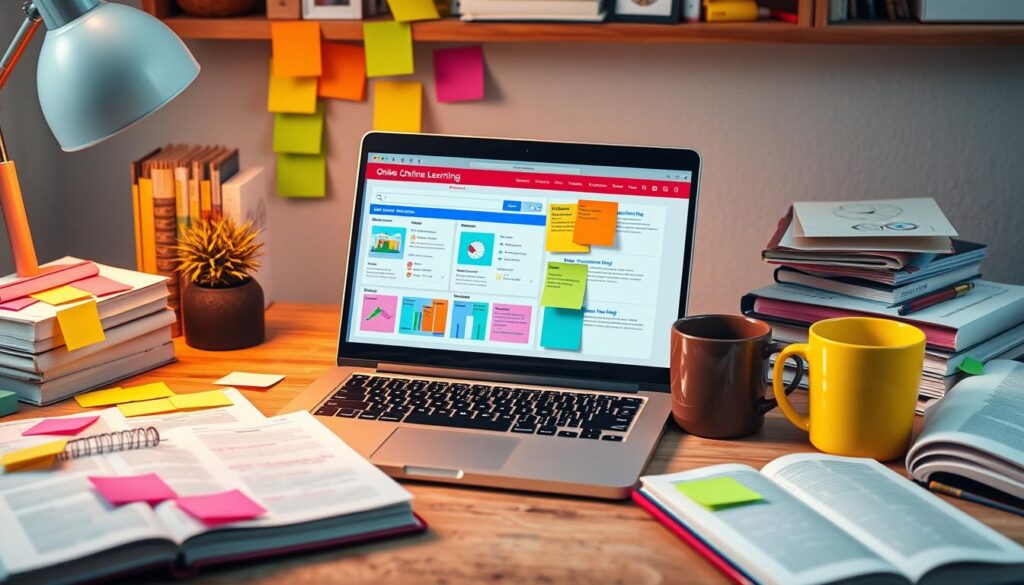Table of Contents
Did you know over 6 million students took online courses before COVID-19? This shows how important effective learning strategies for online learning are. As education moves online, students need special skills to do well.
In this article, we’ll look at proven strategies and best practices for online learning. We’ll talk about how to engage with course materials, handle technical issues, and more. We’ll cover everything you need to succeed in the digital classroom.
Key Takeaways
- Develop active learning techniques to stay engaged in virtual sessions
- Leverage time management skills and online collaboration tools for productivity
- Create a distraction-free, personalized study space to enhance focus
- Establish a consistent routine with dedicated study sessions and breaks
- Seek support from instructors, peers, and university resources when needed
Engage with Course Materials and Peers
Learning online means you need to get involved with the course and talk to your classmates. By diving into the learning and making friends, you get the most out of online classes.
Actively Participate in Discussions and Virtual Sessions
Don’t just sit back in your online classes. Actively participate in talks and online meetings. Ask questions, share your thoughts, and talk with your teachers and friends. This way, you learn more and feel part of the virtual classroom.
Join Extracurricular Activities and Online Communities
- Look into the extracurricular activities your school offers. This could be online study groups, clubs, or social events. They help you meet people, grow your network, and do things outside the course syllabus.
- Join online communities that match your interests or hobbies. These might be chat forums, social media groups, or online events. They let you meet others who share your passions.
Review Assigned Readings and Course Syllabus Thoroughly
Make sure to thoroughly review the readings and the course syllabus. This keeps you organized, lets you know what’s expected, and helps you spot any tricky spots. By really getting into the course materials, you’ll do better in discussions and succeed in your online studies.
Prepare for Technical Challenges
Online learning can face technical hurdles like internet drops and device problems. To keep learning smooth, it’s key to be ready for these issues. Troubleshoot ahead and talk openly with your teachers to lessen the effect of tech troubles.
Troubleshoot Potential Issues
Before classes start, troubleshoot potential issues with your internet and device. Update your system, check for software conflicts, and make sure your gear works right. This way, you’re ready for any tech problems that might pop up during online classes.
Stay Connected with Instructors
If you hit a technical challenge in class, reach out to your teachers. They know the tech hurdles of online learning and can help. Keeping in touch helps find solutions to device issues or internet issues fast.
Have a Backup Plan
- Find a reliable backup plan for your internet, like a mobile hotspot or a place with good Wi-Fi.
- Have a secondary device, like a tablet or phone, ready in case your main computer has problems.
- Know how to contact your teachers, like through email or virtual office hours, for quick help.
Being proactive and having a good backup plan helps you deal with technical challenges. This way, you can keep your focus on learning.
Create a Dedicated Study Space
Having a dedicated study space is key for online learning. It should be comfortable, distraction-free, and personalized. This makes it a welcoming place. By setting aside a specific area, students can better focus and avoid distractions. This boosts their productivity and learning results.
Find a Comfortable and Distraction-free Area
Choosing the right spot for your dedicated study space is vital. It should be quiet, like a corner of your home or a spare room. It should also have good lighting and comfy seating.
Personalize the Space to Make it Inviting
- Add personal touches, like inspirational quotes or photos, to make it feel welcoming.
- Use ergonomic furniture and adjustable lighting to ensure a comfortable environment.
- Keep the dedicated study space tidy and organized to reduce stress and improve focus.
Creating a distraction-free and personalized study space helps students feel more in control of their learning. This can greatly enhance their academic success and well-being.
Establish a Consistent Study Routine
Creating a consistent study routine is key for online learners. It means scheduling study sessions and breaks and setting aside specific days for each subject. This structure helps with time management, keeps you motivated, and makes sure you cover all course materials.
Schedule Dedicated Study Sessions and Breaks
Studies show that active studying leads to better results, while re-reading notes doesn’t help much. To improve your study time, try making study guides, explaining concepts out loud, and using real-life examples. Also, spreading out your studying in short sessions helps you remember better.
Allocate Specific Days for Different Subjects
Setting aside specific days for each subject keeps you organized and focused. Try to have study sessions of 30 to 45 minutes for better results. Studying in different places also boosts your focus and productivity.
Don’t try to do too many things at once during study sessions. Focus on one task and take breaks to refresh your mind. A consistent study routine helps you manage your coursework well and keeps your life balanced.
Break Down Tasks into Smaller Chunks
Online courses can be tough with big projects, long reading lists, or big research papers. It’s key to split these tasks into smaller, doable parts. The Pomodoro technique is great for staying focused and productive by working in set times with breaks.
Research shows that big tasks can cause stress and make it hard to finish assignments. By distributing tasks into smaller parts, they seem less scary. Big tasks can lead to procrastination, lack of interest, and feeling stuck. But, breaking tasks into smaller parts helps you see what’s doable.
- Prioritize your tasks based on deadlines, complexity, or what you like to do first to work better.
- Allocate dedicated time slots for each part to stay on track and keep moving forward.
- Use task management tools like apps, calendars, and checklists to make this plan work.
- Ask for help from teachers, friends, or parents when you need it to get past tough spots.
Breaking tasks into smaller parts helps you focus better, stay motivated, and understand the assignment better. It also helps you learn how to manage projects, which is useful for a long time.
This strategy is not just for online courses. It works for essays, research projects, and presentations too. It helps you handle stress and anxiety from homework. So, use the power of breaking tasks into smaller parts to reach your full potential as an online learner.
Effective Learning Strategies for Online Learning
Online learning is becoming more popular, and it’s key for students to find ways to learn well. A personalized approach is best, using different methods and tools. By engaging with course materials, preparing for tech issues, and setting up a study space, students can do better.
It’s important to get involved in course activities and talk with peers. This means joining discussions, attending virtual sessions, and doing extra activities. Also, reading all the assigned materials and understanding the course plan is vital.
Being ready for tech problems is another big step. Students should solve possible issues before they happen. They should also keep in touch with teachers and have a plan for internet or device failures.
- Make a study area that is free from distractions and comfortable for you.
- Plan out your study time and breaks. Set aside specific days for different subjects.
- Divide big tasks into smaller ones. This makes them less scary and easier to handle.
It’s also good to mix online and offline learning. Take breaks from screens and use paper and pens. This helps avoid eye strain and improves memory.
Lastly, don’t be afraid to ask for help. Use tutoring, study groups, and talk to teachers often. By using these strategies, students can overcome online learning challenges and reach their goals.

Take Breaks from Screen Time
Too much screen time is a big problem for online learners. It’s important to mix online and offline learning. Using notebooks and pens to take notes can help reduce screen fatigue and make learning more balanced.
Blend Online and Offline Learning Strategies
The Pomodoro Technique is great for staying productive. It involves working for twenty-five minutes and then taking a five-minute break. Even a minute-long break can boost your performance when you get back to work.
Switching tasks instead of taking a break can also refresh your mind. This method offers some benefits of taking a break.
Use Notebooks and Pens to Combat Screen Fatigue
Regular breaks keep you motivated, especially with the Pomodoro Technique’s advice for longer breaks after four cycles. Taking breaks from screens is key to avoid eye strain. This is especially true for those who spend a lot of time on screens, like online learners or remote workers.
Creative breaks, like daydreaming or setting new goals, can make you more productive. They engage different parts of your brain.
Movement breaks, like going outside or changing your environment, can make you more alert. They’re good for jobs that need quick thinking. Nourishing breaks, like meditation or naps, help reduce stress and improve focus.
Breaks that involve talking to friends or family can also boost your mood. They help you feel more connected and positive.
Seek Help and Support
Learning online doesn’t have to be alone. Getting help from many sources can really help your studies. Tutoring and study groups offer insights and help you understand better.
Leverage Tutoring Services and Peer Study Groups
Many schools have tutoring, in-person or online, for one-on-one help. Tutors can assist with tough topics and improve your writing. Peer study groups let you work together, share tips, and learn from others.
Communicate Regularly with Instructors
Your teachers are great resources. Keep in touch with them for questions or help. They want to guide you to success.
Looking for help can really help you learn more. It’s a team effort to succeed in online classes. Using all the resources available can make a big difference.

Conclusion
Effective online learning needs a personalized touch. It combines different effective learning strategies and methods. Students can boost their online learning success by engaging with course materials and preparing for tech challenges.
Creating a dedicated study space and sticking to a routine are also key. Breaking tasks into smaller parts, taking breaks, and getting support help too. These steps improve learning in an online setting.
In today’s digital world, a personalized approach is vital for online learning. By using the strategies from this article, students can reach their full potential. They can do well in their studies.
By adopting a holistic and strategic mindset, students can control their learning journey. They can maximize their results and set themselves up for success. Engaging with course materials, adapting to tech, and caring for themselves are essential. These actions unlock the full benefits of learning online.

